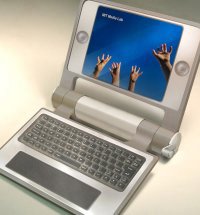Quickly glancing at OLPC
(crossposting from my personal blog)
Quite a while ago i read this post about the rise of cheap computing solutions. In light of the growing critique of the OLPC project, it got me thinking that perhaps, by focusing on the details of this specific project we are overlooking some of its most important contributions.
 Just three or four years ago OLPC was the only project explicitly targeting the developing world and the market for low cost, simple computers. Today, we have over 7 competing models targeting this very market (potentially more). As long as this competition continues we can expect better machines and lower prices in this segment. Perhaps that is good, since industry is probably better in taking care of the technical aspects (even if sometimes it needs a push, such as the OLPC project), leaving space for the educators and activists focusing on developing a decent educational infrastructure to utilize this technology.
Just three or four years ago OLPC was the only project explicitly targeting the developing world and the market for low cost, simple computers. Today, we have over 7 competing models targeting this very market (potentially more). As long as this competition continues we can expect better machines and lower prices in this segment. Perhaps that is good, since industry is probably better in taking care of the technical aspects (even if sometimes it needs a push, such as the OLPC project), leaving space for the educators and activists focusing on developing a decent educational infrastructure to utilize this technology.
The main critique of OLPC from the very beginning was that it should be an educational and not a technological project. And I agree that the technological solution alone is meaningless and the true potential for change lies in appropriate adoption framework, particularly when we talk about education. At the same time, I think that its contribution to the technological push should not be underestimated. Does it make any sense?
On an unrelated note, now you can also use Skype on XO computers. I think this is really cool, even though Skype has been recently loosing its quality.
(Images taken from laptop.org, licensed under the Creative Commons Attribution 2.5.)
Quite a while ago i read this post about the rise of cheap computing solutions. In light of the growing critique of the OLPC project, it got me thinking that perhaps, by focusing on the details of this specific project we are overlooking some of its most important contributions.
The main critique of OLPC from the very beginning was that it should be an educational and not a technological project. And I agree that the technological solution alone is meaningless and the true potential for change lies in appropriate adoption framework, particularly when we talk about education. At the same time, I think that its contribution to the technological push should not be underestimated. Does it make any sense?
On an unrelated note, now you can also use Skype on XO computers. I think this is really cool, even though Skype has been recently loosing its quality.
(Images taken from laptop.org, licensed under the Creative Commons Attribution 2.5.)

 In an article titled
In an article titled 